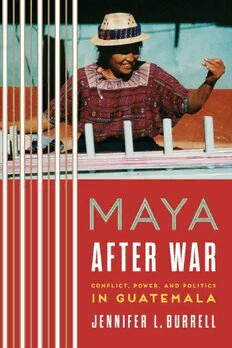
Maya after War: Conflict, Power, and Politics in Guatemala PDF
Preview Maya after War: Conflict, Power, and Politics in Guatemala
Maya after War THIS PAGE INTENTIONALLY LEFT BLANK Maya after War Conflict, Power, and Politics in Guatemala By Jennifer L. BurreLL University of Texas Press Austin Copyright © 2013 by the University of Texas Press All rights reserved Printed in the United States of America First edition, 2013 Requests for permission to reproduce material from this work should be sent to: Permissions University of Texas Press P.O. Box 7819 Austin, TX 78713- 7819 http://utpress.utexas.edu/about/book-permissions ♾ The paper used in this book meets the minimum requirements of AnSi/niSO Z39.48- 1992 (r1997) (Permanence of Paper). Library of Congress Cataloging- in-P ublication Data Burrell, Jennifer L. Maya after war : conflict, power, and politics in Guatemala / by Jennifer L. Burrell. — 1st ed. p. cm. Includes bibliographical references and index. iSBn 978-0-292-74567-4 (cloth : alk. paper) 1. Mayas—Crimes against—Guatemala. 2. Mayas—Violence against— Guatemala. 3. Social conflict—Guatemala. 4. Ethnic conflict—Guatemala. 5. Guatemala—Politics and government. 6. Guatemala—Race relations. 7. Guatemala—Ethnic relations. I. Title. f1435.3.C75B87 2013 305.80097281—dc23 2012035821 doi:10.7560/745674 In memory of Ernest Dupuy THIS PAGE INTENTIONALLY LEFT BLANK Contents Acknowledgments ix Introduction 1 1. War and La Violencia in Todos Santos: Accounting for the Past 23 2. Localities in Conflict: Spaces and the Politics of Mapmaking 38 3. Histories and Silences 56 4. Reimagining Fiesta: Migration, Culture and Neoliberalism 86 5. After Lynching 115 6. Life and Death of a Rural Marero: Generations in Conflict 138 Epilogue: Waiting after War 164 Notes 169 Bibliography 185 Index 209 THIS PAGE INTENTIONALLY LEFT BLANK Acknowledgments In the Mam language of Todos Santos, be’, the path, is a central metaphor for movement through the joys, obstacles, hardships, and digressions of life. Tuj be’ te ‘uj, the path of this book, has been a long and circuitous one, and I have traveled it only by accruing far more debts than I can acknowl- edge here. Ch’jonta tey tuj tnom. Todosanteros shared their lives, stories, histories, and experiences with me, and I can never adequately thank them for this. I deeply admire their struggles for identity and community, and their insistence on the cen- trality of these things. In lieu of thanking individuals, I thank the many people who are friends, family, colleagues, teachers, students, and advo- cates who have shared lives, dreams, visions, and much else with me. It is an honor to have developed such deeply rooted relationships with you and to now share these across generations. Thanks and gratitude to the participants of the mapmaking workshop (and to their parents for facili- tating after- school participation); to the translation team and to those who attended the history workshops. And thanks to all the people I knew as children in Todos Santos, who are now graduating from high schools and universities in Guatemala and the United States, setting off on your own life adventures. It’s most delightful to be connected to you! Resident turistas and antropólogos of various generations shared local news, history, experiences, and chisme from various perspectives. Thanks to Laurel Bossen, Cory Lockhart (and Shannon, Bob, and Dottie), David Salomon, Stacia Shiffler, Summer Sands, Jim ‘el ti’j’ Robinson, Carolina Gallant, Jacqui Clark, Katinka Hoeg, Adriana Dingman, Emma Reuter, Peter Chase, Olivia Carrescia, Deborah Clearman, Becca Young, Anne- mieke Kroone, Gavin Weston, and Ellen Sharp. Frank Taylor’s friend-
